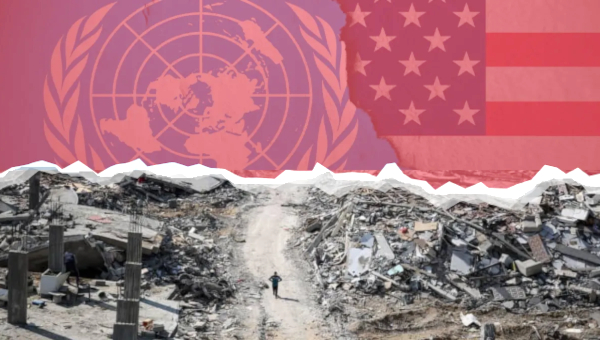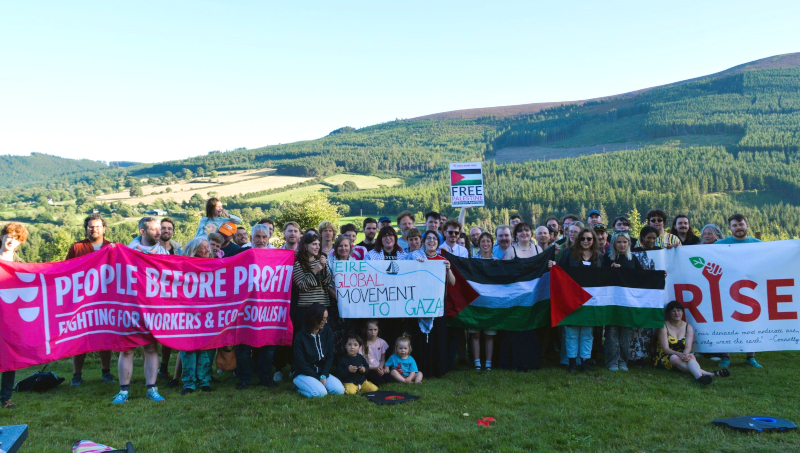David Bush’s article “Syria and the Antiwar Tradition,” in the November 3 issue of The Bullet, is a commendable attempt to debate what antiwar activists in Canada and other “Western” countries should be saying and doing about the current war in Syria.

In that country, the rebel cities that rose up four years ago in revolt against the brutal Bashar al-Assad dictatorship are now under a genocidal siege, bombed and assaulted from the air by Assad’s military, aided and abetted by Russian fighter jets and bombers. Their desperate
fight for survival, if unsuccessful, will put paid to the Arab Spring and with it the potential for building a democratic, anti-imperialist
governmental alternative in the Middle East for an extended period to come. Socialists everywhere have every interest in supporting the
Syrian people and opposing that war.1
David Bush correctly calls for building a broad antiwar movement in this country and he cites as precedents the powerful movements against the Vietnam war in the 1960s and ’70s and the Iraq war in 2003. Oddly, however, in discussing how the antiwar movement should address the
war in Syria, he wants to impose limits on the political message and alignments of the movement that in my view would contradict the goal
of building a united front of opposition to the war. In doing so, he – unwittingly – reveals one of the major reasons why such a movement is lacking.
David takes issue in particular with “sections of the international left” that seek to build a movement of support to the anti-Assad opposition and opposition to the brutal military assault on it by the regime and its allies, chiefly Putin’s Russia. They are framing the complex situation in Syria “in ways that are completely off the mark in terms of guiding an appropriate response at home,” he charges.
Modern Imperialism
For socialists in the imperialist countries, he says, “the main enemy is at home.” In Canada, this means focusing the antiwar movement on
Canada’s “drive to war” while presumably putting solidarity with the Syrian people and their democratic popular uprising on the back burner. He criticizes some left opponents of the war for confusing “the act of building a solidarity movement with the act of building an antiwar movement.” Solidarity, he says, involves “bringing awareness and material support to a group of people,” while an antiwar movement is directed to “stopping your own government’s drive to war.”
“Speaking out on crimes perpetrated elsewhere is important but prioritizing the fight at home is key….”
I fail to see this distinction between building solidarity and building an antiwar movement. The revolutionary socialist movement has
historically not made such a distinction: building mass antiwar movements is precisely the clearest and most direct way to express solidarity with the victims of imperialist war and the democratic and revolutionary forces on a global scale.
“[P]rioritizing the fight at home,” David explains, means that “In Canada, the focus should be on ensuring the Liberals do not re[-]engage with airstrikes in Syria. It also means demanding the [Canadian] troops be withdrawn from the Middle East and from the Ukraine and Eastern Europe, while also advocating for more refugees to be taken in and stopping Canada’s escalating arms trade.”
In themselves, these are good demands. But isn’t there something missing? What about the bombing, and the actually existing war that
is taking place today in Syria? Surely we can’t remain silent on that.
For example, in France an antiwar committee called a demonstration for October 29 in Paris around a number of demands that speak to the self-determination of the Syrian people. Among them: Immediate end to the bombing of Aleppo and in the rest of Syria; departure from Syria of all foreign militias and occupation armies; international prosecution of war criminals; French government assurance of protection, in accordance with international law, of the Syrian people, prevented up to now from having the necessary means to defend themselves against the air bombing of schools, hospitals, markets and homes; immediate and unconditional access to the besieged and starving populations, in coordination with the democratically elected local councils; and immediate freeing of all political prisoners in Syria.
These demands, or some variation of them, should resonate with many people, not least the Syrian exile community whose ranks are now swelled by millions as a result of Assad’s brutal repression. In Ottawa recently, I chanced upon a group of about 100 demonstrators on Parliament Hill waving Canadian and Syrian flags. Almost all of the demonstrators were Syrian Canadians. The demonstration, I was told by the chief marshal, had been hastily organized within their community to call on the Canadian government to protest the bombing of Aleppo and other cities. The demonstrators’ slogans were clear and straightforward: Stop the bombing! End foreign intervention! Trudeau, speak out against Assad’s murderous assault!
But where was the traditional antiwar movement? And what if anything is it doing about Syria? The most recent statement
on the Canadian Peace Alliance web site is headlined Stop Bombing Syria. But it is focused on NATO. Not wrong in principle, but the statement, addressed to Canada’s previous bombing of ISIS positions in Syria, is many months out of date. There is nothing on the CPA
site about the current murderous air and bombing assault on Syria’s cities. And it would appear that across the country the movement is doing nothing to protest the war.
Why the silence? Is it only because Trudeau has pulled Canada’s fighter jets out of Syria; after all, Canadian planes and troops are active in other parts of the Middle East. The CPA denounces the bombing of Syria by Harper and Trudeau but says nothing about the bombing now by Putin.
Shift in Global Geopolitics
In my view, the failure of the antiwar movement in Canada – and elsewhere – to address the situation in Syria is a reaction in part
not only to the admittedly complex nature of the military and political alignments involved but in particular to a shift in global
geopolitics that the anti-imperialist and antiwar activists are having difficulty assimilating and incorporating in their strategy. (For explanations of those alignments see the suggested readings listed at the end of this article.)
To put it bluntly, I sense a reluctance on the part of many activists to condemn the Russian bombing and its alliance with Assad when Russia itself is the target of NATO encirclement and threats of aggression, especially in Eastern Europe. This is understandable. As David Bush
notes, political and economic elites in the “West” are waging a campaign to demonize Russia, reflected in hypocritical attacks on some antiwar organizations for not signing on to that campaign. As David says, we must reject the view that Russia is the main enemy on a global scale. Thus it is logical and correct for him to include the demand for Canadian and NATO troop withdrawals from Ukraine and Eastern Europe among the appropriate demands for the antiwar movement of today.
But does that preclude criticism and denunciation of Russia’s bombing and overall counter-revolutionary strategy in Syria? That was
the view of one comrade in discussions I participated in recently. He expressed his discomfiture at criticism of Russia’s conduct in Syria. “Where Russia is concerned,” he said, we should instead aim our fire at the U.S. and NATO.
This seems an evasion to me. It is not the U.S. or NATO which are bombing the hell out of Aleppo and other dissident cities, it is Assad and his Russian ally. To be sure, Putin’s commitment to maintaining the Assad regime is in part motivated as a response to threatening moves
by the U.S. and NATO in other regions, especially eastern Europe. But do such maneuvers oblige us to maintain silence on Russia’s atrocities in Syria? (As it happens, in Syria the U.S. has been attempting to collaborate with Russia and the Assad regime in efforts to rout its Islamist fundamentalist opponents.)
It is no accident that David turns to the pre-World War I debates among socialists for historical precedents for today’s antiwar movement.
Our world today is much more like the world in the early 20th century, one of contending imperialist powers of uneven strength and influence, than to the Cold War confrontation of East and West blocs that shaped global politics in the latter half of the century.
David draws attention to the linkage between war and imperialism that the early socialists made. As he notes, however, their fine resolutions
were ignored when the war broke out: “most sections of the [Socialist] International sided with their own ruling class.” The
“correct orientation of each national group,” he says, “was to oppose its own ruling class’s drive to war.” The main enemy is at home.
I agree, but would add that this stance did not mean that socialists in one imperialist country would turn a blind eye to the crimes of other
imperialist powers in their mutual rivalry for plunder of resources, new markets and colonies. Socialist internationalism was the corollary of consistent solidarity with all the peoples and nations subject to imperialist exploitation and aggression. That is the essence of the resolutions of the Second International and the Zimmerwald Left cited by David.
United Front of Antiwar Opposition
This points us to the need for political clarity in the united front of antiwar opposition David proposes we build. He cites the precedents
of the mass movements that were built in opposition to the Vietnam war in the 1960s and ’70s and the global mobilizations against the
impending Iraq invasion in 2003. In both cases, as he notes, the “terms of the movement were simple: do you oppose the war? If yes, then let’s join forces on that question and debate other political perspectives along the way.”
“What has been lost in the debate around the war in Syria is precisely this perspective,” he says.
Actually, in the case of the Vietnam war, it was not quite that simple. A fierce debate was waged in the movement, especially in the United States, over the slogans that would build the broadest front of opposition to the war and solidarity with the revolution. In the
beginning many antiwar activists wanted to focus the movement on the demand for negotiations to end the war in the hope of finding common ground with bourgeois politicians by conceding some legitimate interest to Washington, some interest it could defend in negotiations
with the Vietnamese revolutionaries. Those in the militant wing of the movement, on the other hand, argued for the simple demand “Out Now!,” which was consistent with the democratic right of the Vietnamese people to self-determination and thus an expression of the fullest solidarity.
Over time, with mounting antiwar sentiment among the public and the U.S. troops, spurred by the military victories of the Vietnamese fighters
themselves, Out Now became the dominant slogan, and around that demand a mighty movement was built that eventually did force Nixon to
the bargaining table, where Washington was obliged to make concessions that contributed to the ultimate victory of the Vietnamese revolution. (In Canada, we also raised the demand for an end to Canada’s complicity with Washington’s war.)
The point is that opposition to a war may not by itself be sufficient as the basis for building an effective antiwar united front. The central
demands must be principled and point to the clearest and most effective way to end the imperialist intervention and advance the interests of those fighting it on the ground. Thus I would question David’s assertion that in the case of Syria a united front of antiwar opposition should include “all those who advocate for ending the involvement of your own ruling classes.” Would that include supporters of Assad? Of the Russians, or of the other forces allied with them? David rightly rejects such alliances elsewhere in his article. I would think the central political message should include the demand for an immediate end to the bombing and the assault on the civilian population, coupled with other demands that express material solidarity with the Syrians, not their government – along the lines of the slogans raised in the Paris and Ottawa demonstrations I noted above.
In the case of both Vietnam and Iraq, the war was the project of the hegemonic imperialist power, the United States, albeit in alliances
with lesser imperialist powers. And in Vietnam, the other protagonists were North Vietnam and the National Liberation Front: strong forces united around a common project of national liberation, re-unification of their country, and a break from imperialist domination.
In the Middle East today this scenario does not apply in the same way. In fact, the lack of a united anti-imperialist, anti-Hussein movement in Iraq was the primary explanation for the failure of the resistance. And disappointment over the failure of the global antiwar protests in early 2003, immense as they were, to impede the Pentagon assault on Iraq is a major factor in the passivity of the international antiwar movement today. The more recent Arab Spring, inspiring as it was, could not compensate, as it took the form of largely spontaneous uprisings that, even where victorious, did not produce major democratic or popular conquests and in Egypt were soon succeeded by a regime even more repressive than Mubarak’s.
Unipolar World?
But there is a further factor as well. Today’s world differs substantially from that of the Vietnam war. In the 1960s, a military, political and economic bloc led by a dominant imperialist power, the United States, confronted a bloc of states that in one way or another
had been torn from the circuits of capital accumulation under Wall Street’s aegis and constituted a vital source of support and even survival for “Third World” liberation movements, as in the case of the Cuban revolution. Today, in the wake of the collapse of the
ostensibly “socialist” bloc, we need to pay more attention to the shape of the world that is emerging on a global scale. In a context of declining U.S. hegemony and the emergence of new and nuclear-armed capitalist powers like China and Russia, we must assess what that means for the anti-imperialist fighters of today.
I think it is wrong to approach Syria as just another front in some “new Cold War” between Russia and the U.S. and NATO. Each situation must be assessed in terms of the class forces involved, not some abstract geopolitics that overlooks the interplay of contending
imperial interests. In the post-Cold War world, a new era of national and inter-imperialist competition and rivalry, socialists undermine
their own credibility if they limit their “anti-imperialism” to denouncing only their “own” imperialism. As Gilbert Achcar argues in a valuable article, our starting point in this case must be the interests of the Arab revolution, the Arab Spring, and the popular uprising that in Syria erupted almost half a decade ago.
The challenge posed to the antiwar movement by the global configuration of forces is huge, there is no denying it. But where peoples are fighting their oppression and imperialist intervention, there is no dichotomy between antiwar resistance and solidarity with the forces
on the ground. Nor should our solidarity be determined by whether or to what degree the Canadian state is directly involved.
Yes, in Canada we must direct our fire against the Trudeau government’s aggressive moves against Russia and its present and projected military engagements elsewhere, as in Africa.
But a consistent antiwar movement should also have no hesitation in attempting to mobilize solidarity with the Syrian democratic and
popular opposition – for an end to the war: for an end to the bombing, withdrawal of all foreign troops (in this case mainly Russian), and emergency provision of massive food, medical and other necessary supplies to the population in the besieged cities. •





